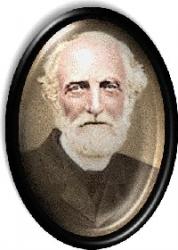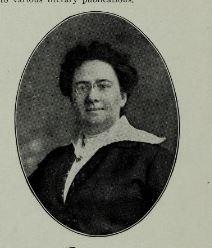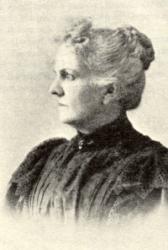
1837 - 1911 Hymnal Number: d194 Author of "The gospel call" in Soul Songs Rv Arthur Tappan Pierson DD USA 1837-1911. Born at New York City, NY, he professed faith in Christ at age 13 upon attending a Methodist revival meeting. He was educated at Hamilton College, Clinton, NY, (1857), and Union Theological Seminary (1869). He married Sarah Frances Benedict in 1860, and they had seven children: Helen, Laura, Louise, Delavan, Farrand, Edith, and Anna. He entered Presbyterian ministry in 1860. He pastored successfully at the Congregational Church, Winsted, CT, (summers of 1859 & 1869), Binghampton, NY (1860-1863), Waterford, NY (1863-1869) Fort Street Presbyterian Church, Detroit, M (1869-1882)I, and at Bethany Presbyterian Church, Philadelphia, PA (1883-1889), where he ran a missionary training school and developed a national reputation as a promoter of missions. While at Detroit, the largest Presbyterian Church in town, the church burned down in 1876, and services were held in a local opera house. Pierson realized he had become prideful and greedy, seeking approval of the rich. As a result, he led his wealthy congregation to reach out to the poor of Detroit. He banished the practice of pew rents, and committed to accepting his salary on a faith basis. A revival broke out as a result. In 1885, at a Bible conference sponsored by D L Moody, Pierson called on Protestant churches to launch a worldwide missionary campaign. In 1886 he authored “The crisis of missions”, the major missions promotional book of the era. He spoke on missions to a group of YMCA collegians at a summer conference convened by Moody in MA. As a result, 100 young men volunteered to be foreign missionaries, and the Student Volunteer Movement for Foreign Missions (SVM) was born. In 1889-90 he nade a missionary tour of the UK. He was editor of the ‘Missionary Review of the world’ (1888-1911), and he lectured on missions at Rutgers College in 1891 and was Duff lecturer in Scotland in 1892. He was a consulting editor for the original “Scofield Reference Bible” (1909), for his friend, C I Scofield. He was also a friend of Dwight L Moody, George Muller, Adoniram Judson Gordon, and Charles H Spurgeon, whom he succeeded in the pulpit of the Metropolitan Tabernacle, London, England, 1891-1893, when Spurgeon suffered from Bright’s disease and asked him to fill his pulpit while he recovered. When Spurgeon died, Pierson was asked to stay on in the pulpit, which he did for two more years. It is notable that Spurgeon asked Pierson to fill his pulpit, when Pierson, a Presbyterian, had not been baptized as a believer. In 1896 Pierson became convinced that believer baptism was correct, and he was then baptized by Spurgeon’s brother, James, at the age of 58. This caused Pierson’s excommunication from the Presbyterian Church, but he continued to worship as a Presbyterian. Pierson spoke with Moody at the Northfield, England, Conferences, and was also a speaker at the Keswick convention, where holiness piety was promoted. Pierson was influential in convincing several Nobel Peace Prize winners to give their lives to missions. Filling several pulpit positions around the world as an urban pastor, he cared passionately for the poor. He was also a pioneer advocate of faith missions, determined to see the world evangelized in his generation. Prior to 1870 there had been only about 2000 missionaries from the U.S. in full-time service, roughly 10% engaged in work among native Americans. In the 1880s a great movement of foreign missions began, in part due to the work of Pierson. He acted as elder statesman of the student missionary movement and was the leading evangelical advocate of foreign missions in the late 19th century. When liberalism began seeping through mainline denominations, Pierson joined other concerned Christian leaders in publishing “The fundamentals”, a series of booklets designed to answer the critics of Christianity. Because of his apologetic abilities, Pierson was invited to write five of the major articles. Each booklet was distributed freely to pastors throughout America, marking the beginning of the Fundamental-Modernist Controversy in American churches. Eventually the booklets were combined into a twelve volume set, available today as a five-volume set. Pierson was called “the Father of Fundamentalism”. In 1898 he wrote a book, “In Christ Jesus”, concluding that a preposition followed by a proper name was the key to understanding the entire New Testament. He was an advocate of ‘day-age creationism’. He pastored at Christ Church, London, England (1902-1903). After retiring, he continued to preach at churches at home and abroad. He visited Korea in 1910 where he taught the Bible in a few churches and was instrumental in founding the Pierson Memorial Bible Institute (presently Pyeongtaek University). Many pastors and scholars came from it. That year he set out to tour missions in East Asia, but grew ill and returned to Brooklyn, NY where he died. It is said that he preached 13,000+ sermons, wrote over 50 books, and he gave Bible lectures as part of a transatlantic preaching ministry that made him famous in Scotland, England, and Korea. All of Pierson’s children professed conversion to Christianity as teens and served as missionaries, pastors, or lay leaders.
John Perry
===========
Pierson, Arthur Tappan, D.D., was born in New York city, March 6, 1837, and educated at Hamilton College. He entered the Presbyterian ministry in 1830, and was pastor successively in Binghampton and in Waterford, New York, and Fort Street, Detroit; his last charge being the Bethany Presbyterian Church, Philadelphia. (Duffield's English Hymns, 1886, p. 576.) Dr. Pierson's hymns include:—
1. Once I was dead in sin. Praise for Salvation.
2. The Gospel of Thy grace. The Love of God in Christ.
3. To Thee, O God [Lord], we raise. Divine Beneficence.
4. With harps and with viols there stand a great throng. The New Song.
Of these hymns, No. 3 is in Hymns and Songs of Praise, N. Y., 1874, and the Laudes Domini, N. Y., 1884; and Nos. 1, 2, 4, are in I. D. Sankey's Sacred Songs and Solos.
-- John Julian, Dictionary of Hymnology (1907)
Arthur T. Pierson


 My Starred Hymns
My Starred Hymns






